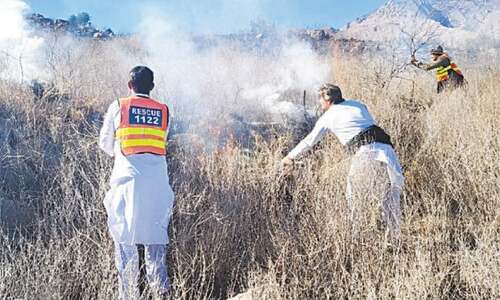PESHAWAR: The United Nations Development Programme (UNDP) has launched Preparedness, Recovery and Emergency Programme (PREP) in nine union councils of Bannu district to share the burden with host families and provide relief and assistance to the temporarily displaced people (TDPs) of North Waziristan.
“Both the host and guest families will take equal benefits of the project. The idea behind the programme is to provide assistance to both the local community and displaced people and also to bridge the gap and promote relationship between them,” said Afzal Yousafzai, coordinator of the programme.
According to a press release issued here, Mr Yousafzai said that they had engaged NGOs like Sarhad Rural Support Programme (SRSP), Participatory Rural Development Society (PRDS) and Initiative for Development and Empowerment Axis to implement the initiative with the support of local community and TDPs.
The project has been launched formally in 40 villages of the nine union councils that have been burdened by the influx of displaced people. “We are working in three union councils. We have already conducted social mobilisation sessions there and formed 25 community organisations, while community-based initiatives for infrastructure development would be started soon,” said Haroon Khan, district programme manager of SRSP.
Baitali, a small village in Mirakhel union council having a population of about 1,200 people, has provided accommodation to over 100 displaced families in the hujras and additional rooms in houses.
Lal Daraz, who teaches at a government school in the locality, has volunteered himself to head one community organisation. He considers lack of education and skill training as the main issues faced by the area people.
Contaminated water is another problem being faced by the local and guest families. He said that such problems would be resolved with the support of UNDP.
Irshad Khattak, an official of SRSP supervising the community organisations, said that they would soon arrange training sessions for the local and displaced youth so that they could earn livelihood for their families. He said that training of plumber, electrician and operating heavy machinery would be imparted to men and tailoring and embroidery to women. He said that schemes for infrastructure development would be launched on need basis.
Noor Niaz, a displaced tribesman and general secretary of the community organisation, said that skill development training would enable their children to get some respectable job even after their return to native area.
Similarly, Bharat Khas village, with about 1,500 host families, has accommodated 150 displaced families. Hayatullah, head of the local community network formed by PRDS, says sanitation is a big issue and they would resolve it on priority.
Published in Dawn, October 23rd, 2014














































Dear visitor, the comments section is undergoing an overhaul and will return soon.